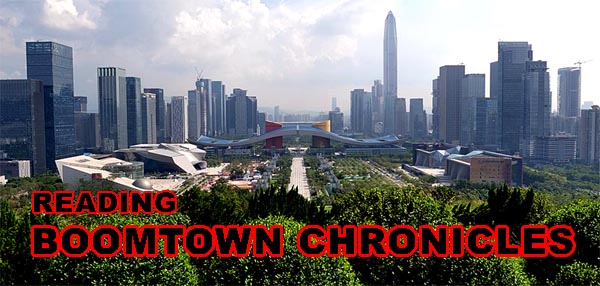 |
| Shenzhen, the Boomtown (Wikipedia) |
Note: Between Lesson #01-128 and #01-208, I wrote 72 lessons explaining expressions in articles published in the Shenzhen Daily. Read more about "Reading Boomtown Chronicles."
Get Ready: Who or what have been some of the biggest influences in your life?
Boomtown Chronicles Part XXI - published Monday, November 17, 2008 (cont.)
- A certain village is "near the confluence of the Shenzhen and Buji rivers."
confluence: where two rivers join. Con-, as you may know, means "with." -fluence is from fleu-, and is related to the word "flow," which is exactly what it means: to flow together. Both flow and -fluence probably come from an Indo-European root *pleu-.
Grammar point: Indo-European is the presumed ancestor of many languages, including Sanskrit, Greek, Roman, and other European languages. No record of this language survives. The roots are derived from modern words that almost certainly come from them, such as "flow" and the -fluent/-fluence words below. When we write words from Indo-European, we add an asterisk (*) to show that the word is hypothetical.
At any rate, this fleu- is found in words like "fluent" (flowing easily) and in affluent (rich, as money flows toward an affluent person), influence (flowing in), and effluence (flowing out).
Let's play just a little more with the word "influence." When we say that one person influences another, we mean that power flows from the one influencing to the one influenced. The stronger influences the weaker.
People used to believe that certain kinds of illness were caused by the power, or influence, of the stars and other heavenly bodies on our lives. The Italian word for "influence" is "influenza," a word we still use in English today, though often in its shorter form: "flu." So people believed that the flu was caused by the negative power of stars flowing into us!
--------
- "The river catchment [is] on the Shenzhen side." Mention is also made of the "watershed" andthe "river banks."
catchment: the area drained by a particular river.
watershed: the dividing line between two different catchments. This would be a high point, such as a ridge or mountain range. So the catchment, or area drained, is also called a river's "watershed."
banks: the sides of a river often slope up out of the water. "Bank" has many meanings, and some of them have different origins. This "bank" comes from a word that means "slope" (we see this in the longer word "embankment"). No, it's not where rivers keep their money!
--------
Read more: https://en.wikipedia.org/wiki/Shenzhen
Practice: Choose the correct term to fill in the blank in the sentence below:
- affluent
- banks
- catchment
- confluence
- effluence
- fluent
- influence
- influenza
- watershed
- The Rocky Mountains are generally the ________ between areas that drain to the Pacific Ocean and areas that drain to the east.
- One notable global pandemic of the past was the ________ epidemic of 1918.
- It's important for ________ people to share their resources with the less fortunate.
- The ________ of the Tigris and Euphrates Rivers is roughly 100 miles north of the Persian Gulf.
- Lobbyists spend millions trying to ________ the decisions of politicians.
- Many early civilizations developed along the ________ of rivers.
- It takes years to become ________ in a language.
- The government tries to regulate the ________ coming out of factories.
- The Mississippi River has the world's fourth-largest ________.
Answers are in the first comment below.
Submitted to the Shenzhen Daily for November 25, 2008


Answers to the Practice: 1. c; 2. f; 3. i; 4. d; 5. h; 6. g; 7. e; 8. b; 9. a
ReplyDelete